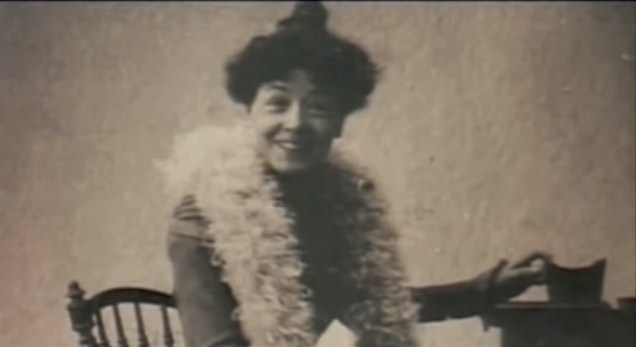 |
| Alice Guy-Blanché |
So how come you never hear of this woman whom Barbra Streisand described as "a French film pioneer who invented the director's job?" Good question.
It is unclear why, when Gaumont published a history of the film industry in France, her name was entirely absent. When she called Gaumont on it, he promised to correct the oversight in subsequent editions. That never happened.
Apparently, she has been "re-discovered" many times in recent years, but her name and accomplishments still go unacknowledged by official film history. Any one of her directing accomplishments should have secured her a place in the pantheon. For example:
... as one of the first persons to direct a film with a narrative structure, and thus to direct actors to convey the essence of the narrative through gestures and actions, Alice Guy is one of the originators of filmic acting, both in theory and in practice. Indeed, she is the first real auteur of the cinema. (from Film International )If you've studied film you probably have seen Sergei Eisenstein's Potëmkin and the "innovative" use of close-ups and reaction shots, shots that Guy used in 1904 film "The First Cigarette." You can read a great article about Alice Guy at Film International or just scan the basic facts below. I've also posted a YouTube video of one of her early comic films, The Consequences of Feminism (1906), which is a reverse-sexism film not unlike many we get submitted to the festival.
For me, her story, what she did vs. how she is remembered, is a good lesson in structural barriers to women's success. It is not enough to level the playing field. If the score keepers fail to mark the wins by women, it will create an atmosphere of disregard. Yes, a woman may seem skilled or competent, but commonplace thinking asserts that if women were really as capable as men, there would be more of their work through history. Novels. Paintings. Films. Structural inequities erase notice, and don't result in a conscious conspiracy, but rather a self-perpetuating neglect. Just as in child-rearing, indifference and neglect are far more damaging to the psyche than domineering and abuse, so too for women's creative work this indifference destroys our inner "muse" with a suffocating vacuum. All the while preserving a comfortable deniability of chauvinism.
So what about Guy-Blanché? She worked for the French inventor Léon Gaumont when the company was primarily a maker of photographic equipment. After accompanying her boss to a screening of a 35mm demo by the Lumiere brothers in 1896, she asked for permission to use the company cameras to make her own film. She got approval contingent on the filming not interfering with her secretarial duties. She made La fée aux choux, one of the world’s first films with a plot shot in her own garden with the help of a female friend. Her films were very successful.
 |
| La Fée aux Choux by Alice Guy-Blanché 1896 |
She become the head of production of the Gaumont film studio from 1897 to 1907. But she got married to co-worker Herbert Blanché who was almost 10 years her junior, and, well, as a married woman was expected to retire. Raise children.
So she and her husband left for the US, where they formed Solax, one of the largest pre-Hollywood studios in America. She was the artistic director while her husband was the production manager. Even while she was pregnant with her second son, she completed at least a film a week, proving that the Hollywood horror, voiced at a Women in Film breakfast I remember, that a woman might get pregnant and ruin a film's production schedule and be rendered by her condition unable to command the shooting of a picture, is suspect baloney worthy of Upton Sinclair's novel, The Jungle.
Hollywood's climate was more congenial to filmmaking, and when husband Herbert headed west with a starlet on his arm in 1918, Alice remained until 1922 when the divorce was final. She then sold the studio and went back to France.
Perhaps Alice Guy-Blanché is the reason that the French have more successful, working women directors than any other country.








